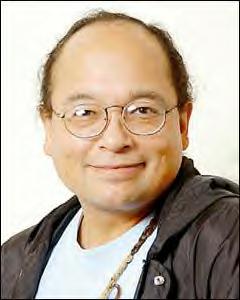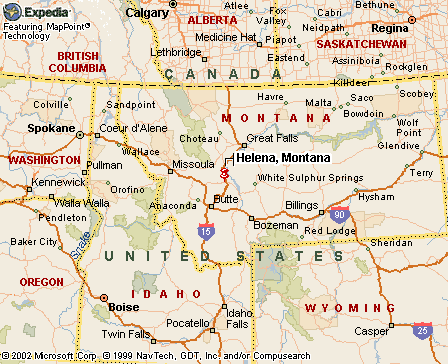|
|
Canku Ota |
|
|
(Many Paths) |
||
|
An Online Newsletter Celebrating Native America |
||
|
October 4, 2003 - Issue 97 |
||
|
|
||
|
Drummer Feels Connection to Pow Wow |
||
|
by Shawn White Wolf Helena Independent Record |
||
|
Cary Youpee grew up around the Oil Celebration — once known as one of the largest gatherings of American Indians — on the Fort Peck Reservation because his family lived and breathed the annual event. Because of that example, Youpee, a volunteer of Helena's community pow wow for five years, has been actively involved in organizing and volunteering at pow wows for nearly 44 years. Most recently, he began drumming after a newfound friend in Helena helped him develop the skills he would need to become a drum keeper. "When
I drum, it feels like a sense of accomplishment because some of
the songs we sing are older than the United States," said Youpee.
Youpee is lead singer and drum keeper for the Magpie Singers, a locally based group that was organized by Tom Sheehy more than a year and a half ago. The group plans to sing at the 5th Annual Last Chance Community Pow wow Sept. 26-28 at the Helena Civic Center. Sheehy had moved to Helena with his wife, the late Antonia Wheeler-Sheehy, former director of the Helena Indian Alliance. Wheeler-Sheehy was killed in a car wreck in January. Since then, the group has continued to perform to American Indian and non-Indian audiences in Helena and around the state. Like Youpee, many American Indians living in the urban communities of Montana are drawn to the steady beat of a hide drum. "It brings back memories of an earlier time when pow wows brought in the whole community," he said. He said he can remember when his people were not allowed to use hide drums, but rather used the band style of drums because people were superstitious about what might happen if American Indians drummed and sang. Even so, he still remembers when his friends or family would practice drumming and singing late into the evening. While some things have changed over the years regarding pow wows, Youpee said, the life of the drum has survived and continues to reconnect families and friends. In the old days, he said, the drum used to sit in the middle of the circle while dancers danced around it. After one song would end, another drum group would come out and retrieve the drum sticks and then sit down on the same drum to play. Today, people bring their own drums and sticks. Youpee said there can be nearly 20 drum groups waiting their turn to sing at any one pow wow . Regardless, he is glad the drummers come. "I've heard it said that if the drum dies then so does our culture," he said. Some of the pow wow-goers don't see each other the whole year, he said, so that's when the pow wow really pulls everyone together. Another recent change in pow wows is the competition attitude that has developed. "It used to be that dancers would compete against the beat of the drum, but today it's as though the dancers are competing more against each other instead," Youpee said. He said the movement began years ago after many elders died off, leaving a gap between the younger generations and traditions. It was then, he said, that contest dancing was started in hopes of attracting younger people back into learning about their dances and culture. While the days when Youpee would pass out five to ten pounds of meat, loaves of bread, butter and coffee to families and friends during the Oil Celebration are as long gone as when he would see hundreds of tepees surrounding a pow wow, he said, the pow wows still bring a community together. For example, he said, most of the funding for the Last Chance Community Pow Wow has come directly from local Helena businesses. "For me, there is no right way or wrong way; it's all good when it's presented in a good way," he said. An old belief among American Indians An old belief among many American Indians is that the drum is its own sovereign entity, living a life of its own. Cary Youpee remembered what his mentor, Tom Sheehy, had told the group when they first started to drum a year and half ago. "I want to tell you we are going to split," said Sheehy. "There are no hard feelings; it's just the way of the drum." Since then, the drum group has split twice, said Youpee. The group practices on Wednesday and Thursday at the East Valley Middle School Library in East Helena. Reporter Shawn White Wolf can be reached shawn.whitewolf@helenair.com |
|
|
www.expedia.com |
|
|
||
|
|
||
| Canku Ota is a free Newsletter celebrating Native America, its traditions and accomplishments . We do not provide subscriber or visitor names to anyone. Some articles presented in Canku Ota may contain copyright material. We have received appropriate permissions for republishing any articles. Material appearing here is distributed without profit or monetary gain to those who have expressed an interest. This is in accordance with Title 17 U.S.C. Section 107. | ||
|
Canku Ota is a copyright © 2000, 2001, 2002, 2003 of Vicki Lockard and Paul Barry. |
||
 |
 |
|
|
The "Canku Ota - A Newsletter Celebrating Native America" web site and its design is the |
||
|
Copyright © 1999, 2000, 2001, 2002, 2003 of Paul C. Barry. |
||
|
All Rights Reserved. |
||
 American
Indians throughout the course of history have remained connected
to both each other and their culture by way of the heartbeat of
the drum and through annual pow wows.
American
Indians throughout the course of history have remained connected
to both each other and their culture by way of the heartbeat of
the drum and through annual pow wows. 